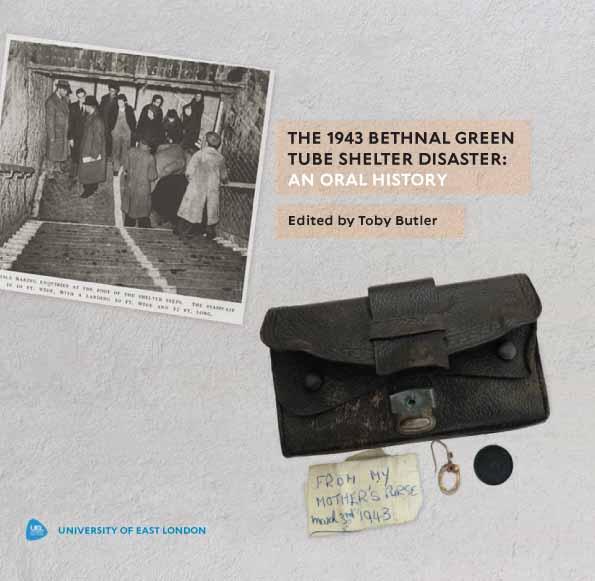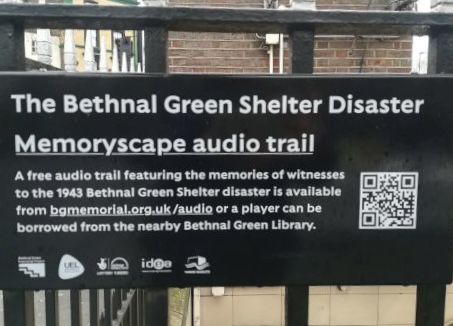The 1943 Bethnal Green Tube Shelter Disaster: an Oral History
The Bethnal Green Memorial Project has distributed 2,000 printed copies of The 1943 Bethnal Green Tube Shelter Disaster: an Oral History, published by the University of East London edited by the project director, Toby Butler. Some printed copies are still available from the University of East London Archives (Docklands Campus). The book features articles on aspects of the disaster and its aftermath and edited highlights from interviews with survivors conducted by project volunteers with witnesses and their families. The book contains much contextual information about the circumstances of the disaster and considers the long term impact of the disaster on individuals and the local community. A free, downloadable PDF version of this publication is available here:

Teaching Pack For Schools And Youth Groups created by the Bethnal Green Memorial Project
This teaching resource is designed to teach children about the Bethnal Green underground shelter disaster of 1943. The lessons have been designed by a professional school teacher (at one of the schools who lost children in the disaster). They are planned to provide learning intentions, teaching material and activities for children between 8 and 12 years old but many of the activities and source materials can be adapted for use at any level.
The lesson pack begins by providing children with some context of World War II, within which the disaster happened. It then take the children on a journey of understanding about the Blitz and how people survived during the bombing campaign in London. It then looks more specifically at what happened on the night of 3 March 1943 and its consequences for the people and the community of Bethnal Green. Finally it leads children into thinking about how the disaster is being remembered today. We provide a range of resources, activities and worksheets that are linked to each lesson. We provide documents, images, maps and oral history clips for children to work on. We provide PowerPoint presentations, audio and images that can be used to deliver the lesson and suggest challenges that encompass a wide range of areas including art, design, critical thinking and drama. The lesson plans are designed to meet the demands of the National Curriculum local history element.
The teaching pack consists of the following elements, and all are free for educational use:
1. Teaching pack notes and lesson plans: this booklet gives an introduction to the resources, summary lesson plans and more detailed guidance notes for each lesson.
2. Worksheets: these are the all the printed resources mentioned in the lesson plans. They include reading materials, maps, images and answer sheets. They are clearly labelled according to each lesson and activity.
3. PowerPoint presentations and audio files to accompany each lesson (please note that note that some lessons do not include presentations/audio files).
In addition, more detailed information in the project Oral History book may be useful. Finally teachers may be interested in taking their class to the site of the disaster. The children's audio trail is 30 minutes long and can be downloaded to you own equipment or a set of 32 players can be borrowed for free from Bethnal Green Library which is situated close to the memorial (see below for more details).
Teaching pack downloads
We recommend downloading the whole pack in one file. For speed it is compressed into a special folder and your computer may require special software to open the folder once it is downloaded (such as express zip free)
Teaching pack - click here to download everything in one compressed folder
If you prefer you can download the files individually, they are listed below. Click on each link below to download files one at a time. Please note you must read the teachers pack notes and lesson plans document - it fully explains what each lesson is about, the lesson resources alone won't make much sense without it! Not all lessons have worksheets/presentations/audio files, so don't be concerned if one or more of these are not present in any particular lesson.
Introduction
Lesson 1: Context - World War II
Lesson 2: Bombing civilians
Lesson 3: The Disaster - What happened?
Lesson 4: The Inquest: What caused the disaster?
Lesson 5: Designing safe shelters
Lesson 6: The impact of the disaster
Lesson 7: memorials: why do we need to remember?
Memoryscape Audio Trail by the Bethnal Green Memorial Project
The audio trail is designed to be played at the memorial and give a deeper understanding of the history of the disaster. It includes many clips from interviews with survivors talking about their experience of the disaster.
The audio trail comes in two versions; one for children and another for adults. You can listen online (stream the recording) using the players below; or download the complete trail to your phone or mp3 player using the links below. Both trails are approximately half an hour in length and 30MB in size.
It is also possible to borrow audio players for free from Bethnal Green Library which is next to the memorial. It has 32 players loaded with both adult and child versions of the trail. You can call the library on 020 7364 3492 to check opening times and player availability.
You can listen to the ADULT'S trail online below or click here to download the adult's audio trail:
You can listen to the CHILDREN'S trail online or click here to download the children's audio trail:
These trails are promoted on a plaque which is adjacent to the memorial, on the railings directly above the staircase where the disaster occurred. It contains a weblink and a QR code to this web page, which is designed to work on a variety of screen sizes and mobile devices.
If you are reading this page on a mobile device, please note that this website also contains a wealth of other material on the disaster, including the original interview recordings, a free downloadable book on the disaster and teaching materials - do explore the rest of the site after you have experienced the memoryscape trail.

Inverviews conducted by the Bethnal Green Memorial Project
Interviews will be available shortly